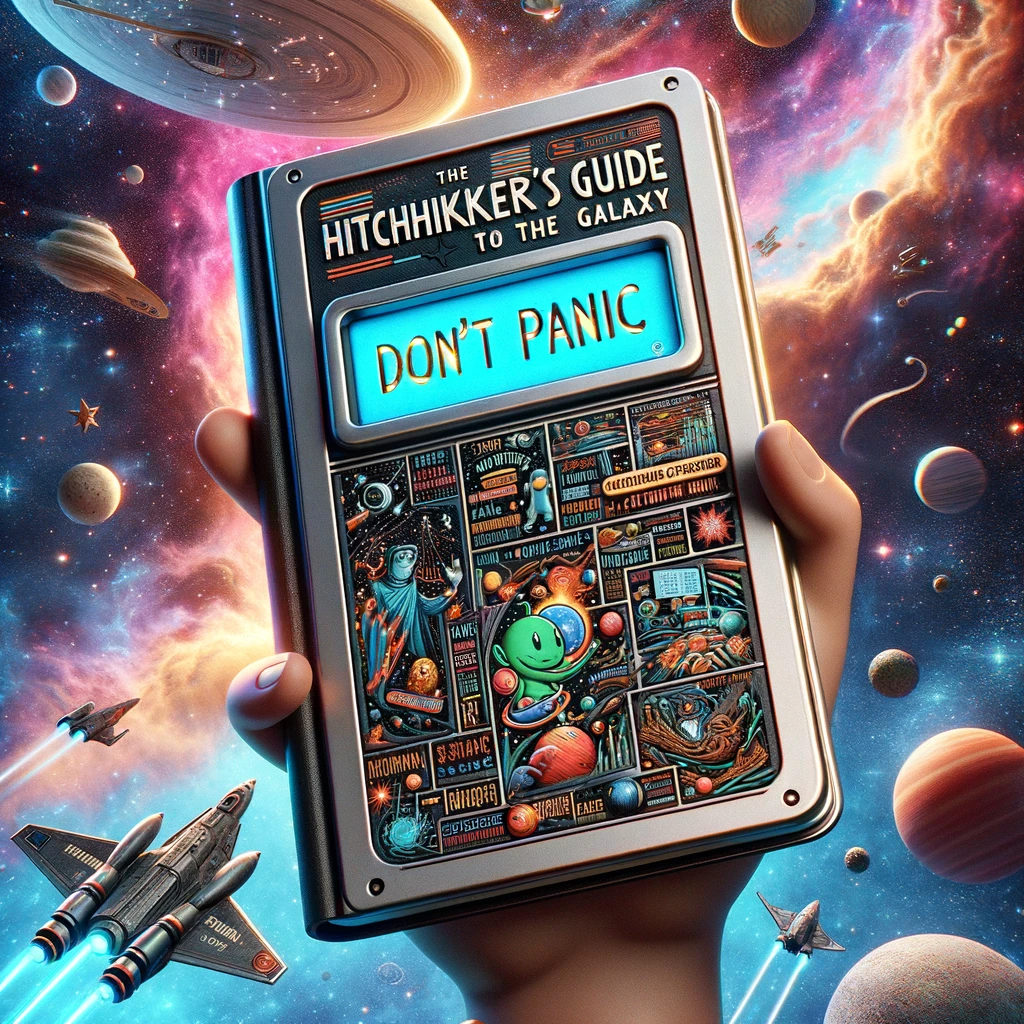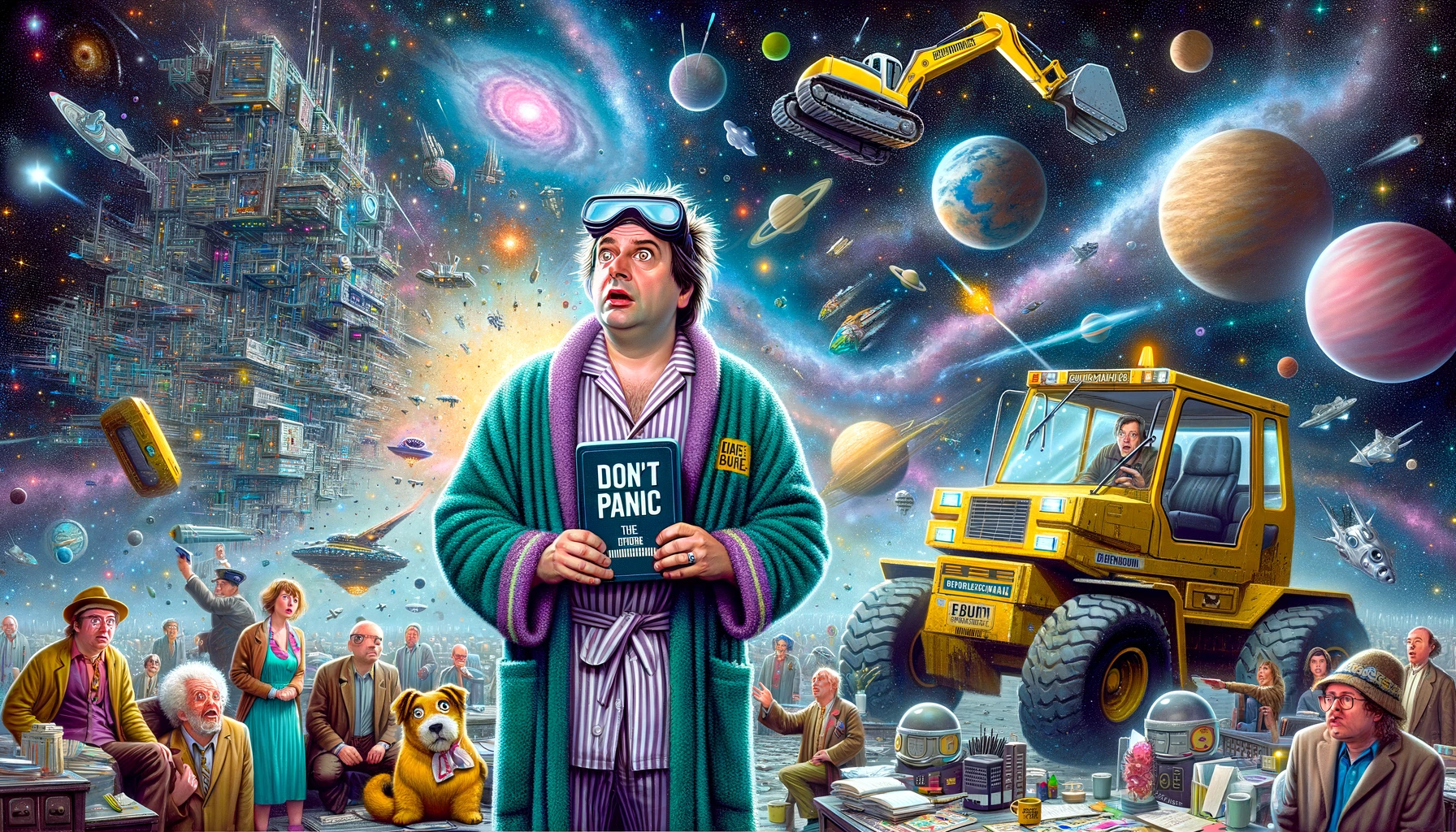Embark on a cosmic escapade that stretches the bounds of imagination and humor with the Hitchhiker’s Guide to the Galaxy.
For generations, Douglas Adams’ seminal work, “The Hitchhiker’s Guide to the Galaxy,” has propelled readers across the universe on a voyage studded with laughter, quirky conundrums, and thought-provoking satire. More than just a science fiction narrative, it’s a cultural touchstone that has charmed and challenged our views on life, the universe, and everything in between.
This exploration isn’t just about revisiting the series’ origins, themes, or its rippling effects on popular culture. It’s an invitation to understand the very fabric of this intergalactic odyssey — a peculiar Guide within a Guide.

What is The Hitchhiker’s Guide to the Galaxy?
At its core, “The Hitchhiker’s Guide to the Galaxy” is a compendium of fantastical tales that begin with an average Earthman, Arthur Dent, and his unwitting embarkation on a journey through space. He’s plucked from Earth’s destruction by Ford Prefect, a researcher for the eponymous Guide, which is not just a book within this story, but a vast repository of galactic knowledge with cheeky insights into the cosmos’ most arcane corners.
This Guide, electronic and sentient, is the ultimate travel companion for space adventurers, brimming with information on various alien races, planets, and cosmic phenomena. It’s notorious for its lack of practical information, often displaying the phrase “Don’t Panic” on its cover as a mild comfort to interstellar hitchhikers.
The Genesis of the Guide
Douglas Adams’ brainchild sprouted from the airwaves of BBC Radio 4 and blossomed into novels, a television series, and various other media, embodying the spirit of the Guide with its own evolution. With each adaptation, the essence of the series — its heart, humor, and a touch of absurdity — captivated a growing audience, eager for Adams’ witty take on existence.
Philosophical Musings and Cosmic Wit
Beneath the laughter induced by Adams’ sharp wit lies a tapestry of philosophical threads. The series contemplates the grandeur and absurdity of the cosmos, pairing it with the mundane and trivial aspects of human life. It poses the grand question of life, only to answer it with an anticlimactic “42,” a metaphor for the incongruity between the questions we ask and the answers the universe has in store.
The Guide’s portrayal of humans as insignificant creatures in the vast tapestry of the universe forces us to reckon with our existential place. Through humor and satire, Adams nudges us to consider our role in a universe that is larger, stranger, and more complex than we can fathom.
A Legacy Cast Across the Stars
The cultural footprint of “The Hitchhiker’s Guide to the Galaxy” is as vast as the universe it depicts. Its lexicon has infiltrated the English language, its concepts have inspired technological innovations, and its philosophies have found a place in the hearts of readers and thinkers alike. The series has become a rite of passage for science fiction enthusiasts, encapsulating the genre’s ability to entertain and inspire profound reflection.
Conclusion: Embrace the Galactic Oddities
Whether you’re a die-hard aficionado or a newcomer to Adams’ universe, “The Hitchhiker’s Guide to the Galaxy” offers a journey that’s as intellectually stimulating as it is uproariously entertaining. It’s a work that encourages you to ponder the big questions, to find comfort in the absurd, and to always carry a towel — the most massively useful thing an interstellar hitchhiker can have.
As you traverse the narrative’s zany cosmos, you’ll encounter a tapestry of characters, from two-headed ex-presidents to depressed robots, all while grappling with the nature of reality itself. So, take the leap into the galactic unknown, and let the Guide guide you through the stars. “The Hitchhiker’s Guide to the Galaxy” isn’t just a story; it’s an experience, a journey, a guide — in every sense of the word.
